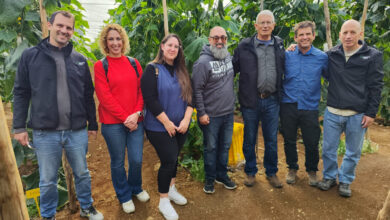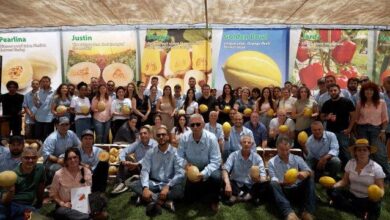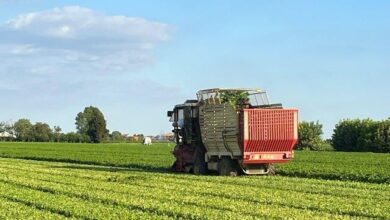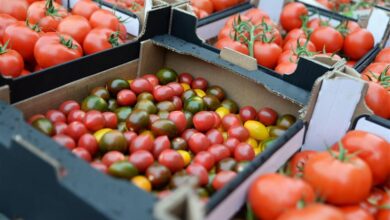while melons, watermelons and other summer fruit help to alleviate the oppressive heat, the people enjoying them are blissfully unaware of the hard work that goes into getting them to the supermarket shelves.
hananel, origene seeds company agronomist, told us about his company’s cucurbitaceae development efforts with reference to the picking season, taste, colour and texture; also regarding shelf life, yields and a public with ingrained traditional tastes, which have to be considered when introducing new varieties.
early in the height of the picking season we find the juicy ananas melon with its oval shape and orange flesh. most varieties have a 3–4 day shelf life and must be sold four days after picking but they are popular both in israel and overseas.
the galia is picked at the season’s end. origene’s r&d department met the challenge of providing ananas melons for the entire season by introducing varieties that would produce mid-season fruit with the popular texture and a long shelf life.
this melon can remain on the plant when it is hot, and ripen in extreme heat. our team has developed both early-season and high-season ananas melons, which picked consetratly. now pickers only have to visit the fields twice, instead of four or five times, consumers enjoy sweet, firm fruit and farmers suffer very little wastage.
 |
the extended shelf life benefits everyone. the grower gets a better price and the customer will continue to buy from him. the wholesalers and retailers suffers little wastage and the consumer can keep the fruit in the fridge for several days.
origene seeds is developing two late season galia type varieties: the small, green flesh, very tasty glory, and the orange fleshed justin. they both have long shelf life with clear advantages to growers, wholesalers, retailers and consumers, which fuels increasing demand both in israel and worldwide.
europeans and south americans are well familiar with the bright yellow canary, which is a bit too sweet for the israeli palette. it has a very long shelf life. some growers experimented with it for the local market and, since israeli consumers are open to new tastes, it has a good chance of success.
watermelons
origene seeds remains a leader in its development of two mildew resistant watermelon varieties. the fruit is large, dark coloured, highly resistant to mildew and ripens early.
recently, origene has been developing 4–6 kilo midi watermelons. being fridge sized, they have become popular, the taste is familiar and they are highly resistant, which is particularly important for late crops in hot weather. yields are high, about 7–8 ton per dunam [28–32 ton per acre],
origene’s two leading midi varieties are lajoya and max. they have high yields, long shelf life, can grow when it is hot and max is particularly mildew resistant.
both varieties proved themselves last year and this year yields should be high, with encouraging feedback from both growers and consumers.
 |
squash
most consumers prefer the light coloured, short, tapered cylindrical variety. unfortunately, they have a short shelf life and are vulnerable to bruising. origene seeds and volcani institute are developing ofeq, a globally popular zucchini variety that is long, dark green and has a long shelf life. israelis were delighted to discover that it does not disintegrate when cooked. growers found that the year round zucchini yields are higher than the lighter variety.
hananel concluded that while origene’s main task is development, it must think outside the box when educating its growers, marketers and consumers about its new, tasty, durable varieties.
photos: origene seeds ltd. public relations





